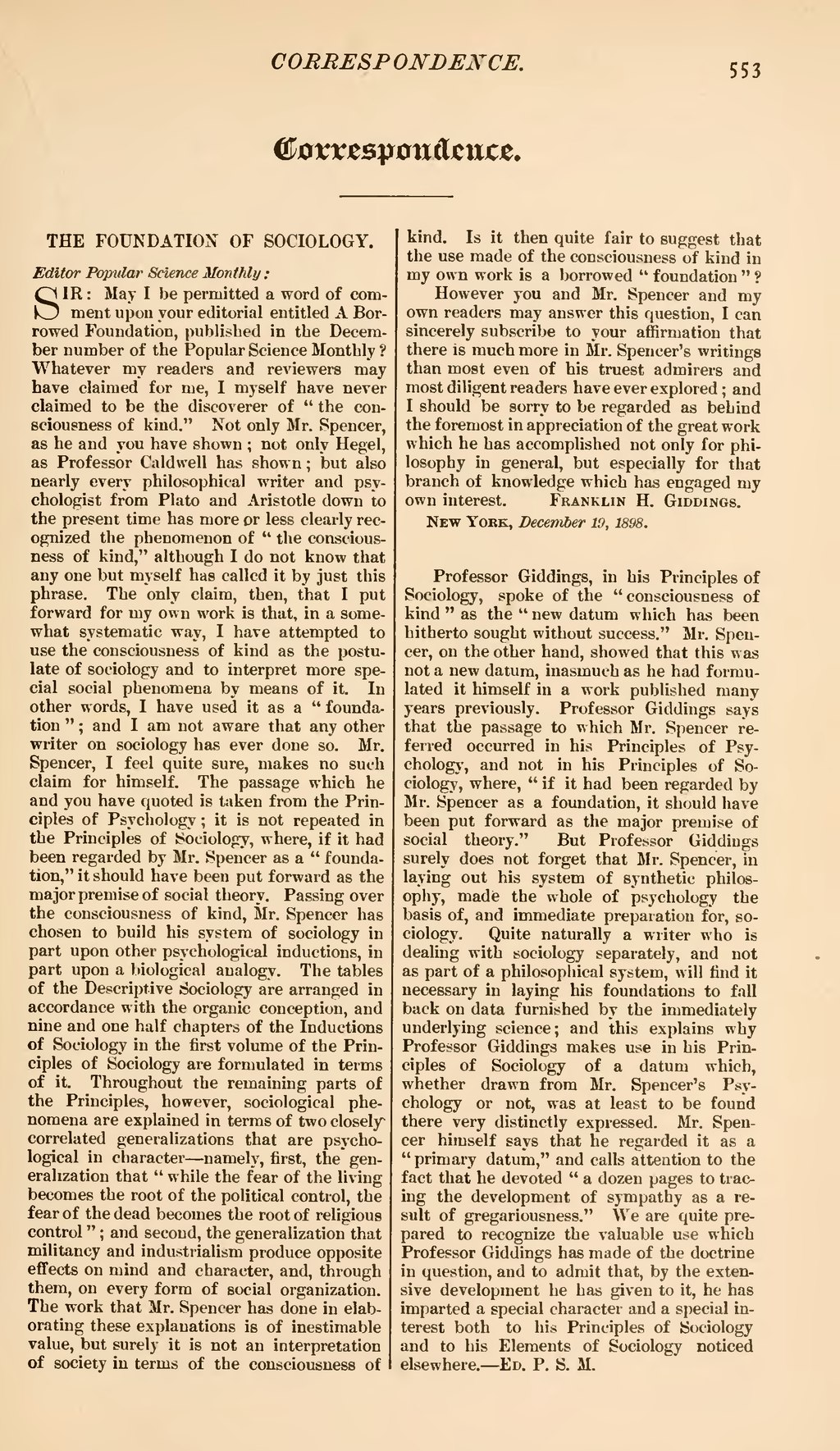THE FOUNDATION OF SOCIOLOGY.
Editor Popular Science Monthly:
SIR: May I be permitted a word of comment upon your editorial entitled A Borrowed Foundation, published in the December number of the Popular Science Monthly? Whatever my readers and reviewers may have claimed for me, I myself have never claimed to be the discoverer of "the consciousness of kind." Not only Mr. Spencer, as he and you have shown; not only Hegel, as Professor Caldwell has shown; but also nearly every philosophical writer and psychologist from Plato and Aristotle down to the present time has more or less clearly recognized the phenomenon of "the consciousness of kind," although I do not know that any one but myself has called it by just this phrase. The only claim, then, that I put forward for my own work is that, in a somewhat systematic way, I have attempted to use the consciousness of kind as the postulate of sociology and to interpret more special social phenomena by means of it. In other words, I have used it as a "foundation"; and I am not aware that any other writer on sociology has ever done so. Mr. Spencer, I feel quite sure, makes no such claim for himself. The passage which he and you have quoted is taken from the Principles of Psychology; it is not repeated in the Principles of Sociology, where, if it had been regarded by Mr. Spencer as a "foundation," it should have been put forward as the major premise of social theory. Passing over the consciousness of kind, Mr. Spencer has chosen to build his system of sociology in part upon other psychological inductions, in part upon a biological analogy. The tables of the Descriptive Sociology are arranged in accordance with the organic conception, and nine and one half chapters of the Inductions of Sociology in the first volume of the Principles of Sociology are formulated in terms of it. Throughout the remaining parts of the Principles, however, sociological phenomena are explained in terms of two closely correlated generalizations that are psychological in character—namely, first, the generalization that "while the fear of the living becomes the root of the political control, the fear of the dead becomes the root of religious control"; and second, the generalization that militancy and industrialism produce opposite effects on mind and character, and, through them, on every form of social organization. The work that Mr. Spencer has done in elaborating these explanations is of inestimable value, but surely it is not an interpretation of society in terms of the consciousness of I kind. Is it then quite fair to suggest that the use made of the consciousness of kind in my own work is a borrowed "foundation"? However you and Mr. Spencer and my own readers may answer this question, I can sincerely subscribe to your affirmation that there is much more in Mr. Spencer's writings than most even of his truest admirers and most diligent readers have ever explored; and I should be sorry to be regarded as behind the foremost in appreciation of the great work which he has accomplished not only for philosophy in general, but especially for that branch of knowledge which has engaged my own interest.
| Franklin H. Giddings. |
| New York, December 19, 1898. |
Professor Giddings, in his Principles of Sociology, spoke of the "consciousness of kind" as the "new datum which has been hitherto sought without success." Mr. Spencer, on the other hand, showed that this was not a new datum, inasmuch as he had formulated it himself in a work published many years previously. Professor Giddings says that the passage to which Mr. Spencer referred occurred in his Principles of Psychology, and not in his Principles of Sociology, where, "if it had been regarded by Mr. Spencer as a foundation, it should have been put forward as the major premise of social theory." But Professor Giddings surely does not forget that Mr. Spencer, in laying out his system of synthetic philosophy, made the whole of psychology the basis of, and immediate preparation for, sociology. Quite naturally a writer who is dealing with sociology separately, and not as part of a philosophical system, will find it necessary in laying his foundations to fall back on data furnished by the immediately underlying science; and this explains why Professor Giddings makes use in his Principles of Sociology of a datum which, whether drawn from Mr. Spencer's Psychology or not, was at least to be found there very distinctly expressed. Mr. Spencer himself says that he regarded it as a "primary datum," and calls attention to the fact that he devoted "a dozen pages to tracing the development of sympathy as a result of gregariousness." We are quite prepared to recognize the valuable use which Professor Giddings has made of the doctrine in question, and to admit that, by the extensive development he has given to it, he has imparted a special character and a special interest both to his Principles of Sociology and to his Elements of Sociology noticed elsewhere.—Ed. P. S. M.

